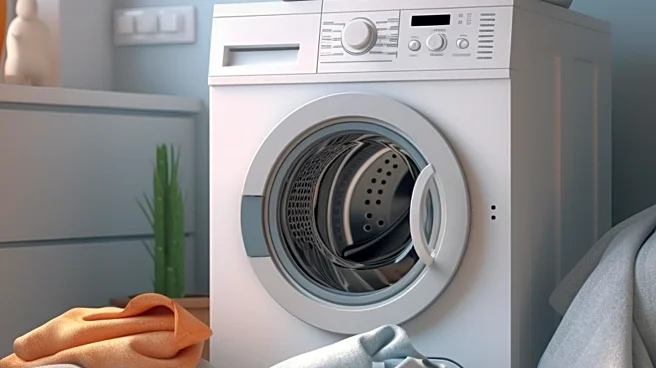What is the story about?
What's Happening?
Consumer Reports has provided a series of practical tips aimed at reducing energy consumption and costs associated with doing laundry. Rich Handel, a laundry expert from Consumer Reports, emphasizes the importance of using concentrated detergents and avoiding fabric softeners. He suggests using only about 3 tablespoons of a high-performing detergent, which can also be used for pre-treating stains. Tests by Consumer Reports found Tide Plus Ultra Stain Release to be effective for tough stains, while Costco's Kirkland Signature detergent is recommended for everyday use. Handel advises against fabric softeners and dryer sheets due to their potential to leave residues that can affect clothing and dryer performance. To save energy, he recommends using cold water for washing, as heating water accounts for nearly 90% of a washer's energy use. Additionally, opting for a dryer's automatic cycle or air-drying clothes can further reduce energy consumption. For those in the market for new appliances, LG's washer and dryer models have received top efficiency scores in Consumer Reports tests.
Why It's Important?
The guidance from Consumer Reports is significant as it addresses the growing concern over rising utility bills, particularly in the context of household energy consumption. By adopting these energy-saving practices, consumers can potentially lower their electricity costs, contributing to overall household savings. This is particularly relevant as energy prices fluctuate and environmental concerns prompt more individuals to seek sustainable living practices. The advice also highlights the importance of informed consumer choices in purchasing energy-efficient appliances, which can have long-term financial and environmental benefits. The emphasis on reducing energy use aligns with broader efforts to decrease carbon footprints and promote sustainability.
What's Next?
As consumers become more aware of energy-saving practices, there may be an increased demand for energy-efficient appliances and products. Retailers and manufacturers could respond by offering more eco-friendly options and promoting energy-saving features. Additionally, there may be further educational campaigns or resources provided by organizations like Consumer Reports to help consumers make informed decisions. The trend towards sustainability could also influence policy decisions, encouraging incentives for energy-efficient home appliances and practices.
















